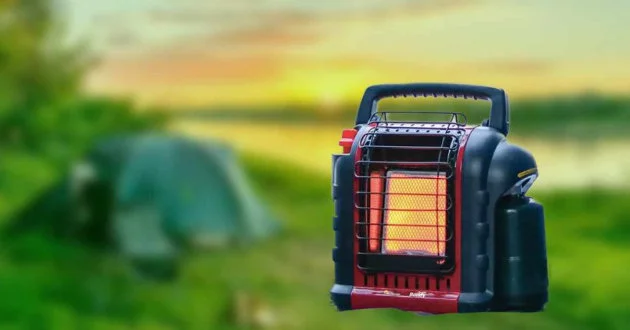Are Tent Heaters Safe?
Camping is a great way to get outside and enjoy nature. However, it can be a little cold at night, especially in the winter. That’s why many people choose to bring tent heaters with them on their camping trips.
While tent heaters are a convenient way to stay warm, they can also be dangerous if not used properly. In this blog post, we will discuss if Tent Heaters are safe, what dangers come with tent heaters and how to use them safely while camping!
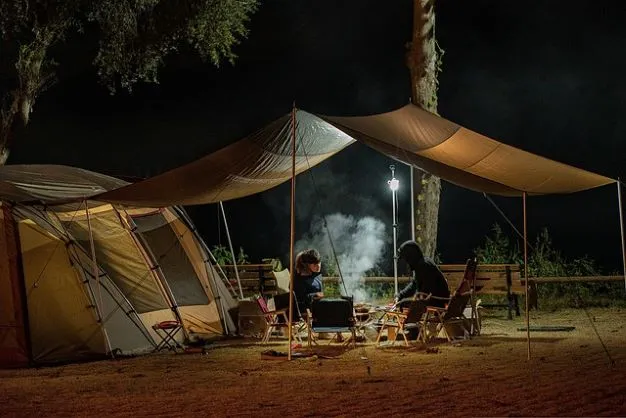
Are Tent Heaters Safe?
Yes, Tent Heaters are safe to use. When used correctly, tent heaters are safe to use. However, there are some dangers that come with tent heaters if they are not used properly.
Tent Heater Risks
The biggest danger of using a tent heater is the risk of fire. If a tent heater is left unattended or placed too close to flammable materials, it can start a fire. This is why it’s important to always keep an eye on your tent heater and make sure it is placed in a safe location.
Another danger of tent heaters is carbon monoxide poisoning. Tent heaters that use gas, oil or kerosene can produce carbon monoxide gas. This gas is odorless and colorless, so you might not even know it’s there. If too much carbon monoxide builds up, it can be poisonous.
To avoid carbon monoxide poisoning, make sure your tent heater is well-ventilated. Do not use it in an enclosed space and never leave it running while you sleep.
Tent Heater Safety Tips
Now that we’ve discussed the dangers of tent heaters, let’s talk about how to use them safely.
– Always supervise your tent heater and never leave it unattended.
– Place your tent heater in a safe location away from any flammable materials.
– Make sure your tent heater has proper ventilation.
– Do not use your tent heater in an enclosed space.
– Never leave your tent heater running while you sleep.
By following these safety tips, you can enjoy the warmth of your tent heater without worry!
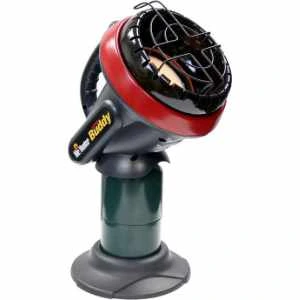
Using a Tent Heater Safely
Tent heaters can be a great way to stay warm while camping, but they also come with some inherent risks. If you’re not careful, you could end up causing a fire. Here are a few tips to help you stay safe while using a tent heater:
– Only use tent heaters that are specifically designed for use in tents. Don’t try to rig up some other kind of heater – it’s not worth the risk.
– Make sure the tent heater you’re using is placed on a level surface and is well-ventilated. You don’t want it tipping over, and you need to be able to monitor it so it doesn’t overheat.
– Never leave a tent heater unattended. If you have to step away, turn it off first.
– Keep flammable materials (like blankets and pillows) away from the tent heater. And never use tent heaters in tents that are made of flammable materials like nylon.
– Be extra careful if you’re using a tent heater in a low-oxygen environment like high altitudes or underwater – these environments can increase the risk of fires.
Following these simple safety tips will help you enjoy the warmth of your tent heater without putting yourself at unnecessary risk.
Can you leave a tent heater on all night?
It is never recommended to heat your tents during your sleep. You don’t want to leave your portable heater on during an absence. The owner’s manual says that the heat pump should be used when SLEEPING.
Tent heater safety varies depending upon several factors, including ventilation and the use of carbon monoxide sensors to monitor when the unit is in operation.
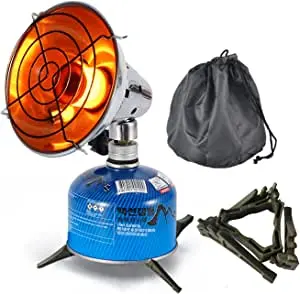
What Type of Tent Heater is Available
The main types of Tent Heater available on the market are :
– Electric tent heaters –
These are the safest type of tent heater, as they don’t produce any fumes. However, they are not as effective in cold weather and you will need to have access to an electricity source.
– Gas tent heaters –
These tent heaters use gas (usually propane) to generate heat. They are very effective, but you need to be careful with them as they can produce carbon monoxide.
– Kerosene tent heaters –
Kerosene tent heaters work in a similar way to gas tent heaters, but they use kerosene instead of gas. Again, you need to be careful with them as they can produce carbon monoxide.
Choosing the right tent heater for your needs is important, as each type has its own advantages and disadvantages. Make sure you do your research before making a purchase!
No matter what type of tent heater you choose, it’s important to use it safely. Follow the tips listed above to help you enjoy a warm, safe camping trip!
Propane Heaters vs Electric Heathers
Propane heaters and electric heaters are two of the most popular tent heaters on the market. But which one is right for you? Here’s a quick comparison of the two types of heaters:
– Propane heaters are more effective in cold weather, as they generate more heat.
– Electric heaters are safer to use, as they don’t produce any fumes.
– Propane heaters are more expensive to run, as you need to buy propane canisters.
– Electric heaters require an electricity source, which may not be available in some camping areas.
A Propane heater is also a great option if you have a propane gas stove as you can use the propane canister from your cooking set for your heater.
Both the propane heater and electric heaters have their own advantages and disadvantages. It’s important to choose the right heater for your needs!
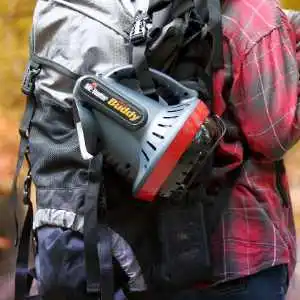
Using a Propane Heater
When using a propane heater , there are a few safety considerations you need to take into account:
– Make sure the tent heater is placed on a level surface and has proper ventilation. You don’t want it tripping over, and you need to be able to monitor it so it doesn’t overheat.
– Never leave a tent heater unattended.
– Keep all flammable objects clear of your propane tent heaters at all times.
– If possible use a carbon monoxide alarm to monitor your carbon monoxide levels inside your tent.
– Make sure the heater is safe by never leaving it turned on and unattended.
Carbon Monoxide from Propane Heaters
Carbon monoxide is a colorless, odourless gas, which is therefore not detectable by using any instrument. Carbon monoxide kills through oxygen deprivation in the gastrointestinal system.
Propane tent heaters contain carbon monoxide. However the newer heaters include sensors which measure the temperature of the room and shut it off when oxygen levels drop too low.
Signs of Carbon monoxide Poisoning
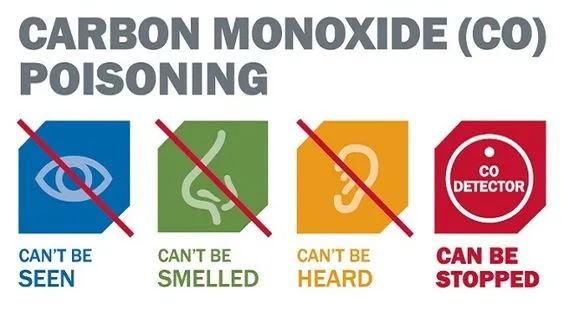
– Dizziness
– Nausea
– Severe headaches
– Fatigue
– Shortness of breath
If you experience any of these symptoms, you should leave the tent immediately and get some fresh air. If the symptoms persist, seek medical attention immediately.
The best propane heaters for camping
You probably know the propane gas heater as a popular winter camping gear equipment. The Mr Heater Buddy heater is available in various dimensions suitable for large or small tents.
Tents are not just for camping; they can be your best friend on those cold winter nights. If you need to heat an area larger than 250 ft2, then purchase the Mr Heater Buddy tent heater!
It’s got all of its safety features and packs quite a punch with surplus warmth that will keep everybody cozy inside no matter what time it may seem.
Using an Electric Heater
When using an electric heater in your tent, there are a few things you need to keep in mind:
– Electric heaters must be placed on a level surface.
– The tent heater should be well ventilated.
– Keep all flammable objects clear of your electric tent heaters at all times.
– Use a tent heater with an automatic shut-off feature to avoid overheating.
– Never leave your tent heater unattended.
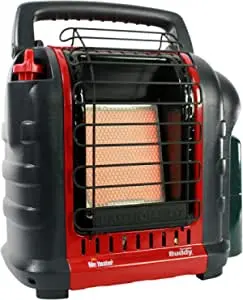
Electric Tent Heater Power Source
Most electric tent heaters will need to be plugged into an outlet. If you’re camping in an RV, this is no problem. But if you’re tent camping, you may not have access to an electrical outlet. In this case, you’ll need to use a portable power source like a generator or solar panel.
Generators are a great option if you have one, but they can be quite loud. If you’re looking for a quieter option, solar panels are a good choice. You can use them to charge a battery, which will then power your tent heater.
Solar panels are becoming increasingly popular as they’re more environmentally friendly than generators. However, they can be quite expensive. If you’re on a budget, a generator is a good option.
What Size Electric Heater Do I Need?
When choosing an electric tent heater , you need to consider the size of your tent. A small tent will only need a small heater, while a large tent will need a larger heater.
The best electric tent heaters are small and compact, so they don’t take up much space in your tent. They should also have an automatic shut-off feature to prevent overheating.
Electric Heater Batteries
If you’re using a solar panel to power your electric tent heater, you’ll need to use a battery. The size of the battery will depend on the size of your tent and the amount of time you plan on using the heater.
For example, if you have a small tent and only plan on using the heater for an hour or two, you can use a small battery. But if you have a large tent and plan on using the heater for a longer period of time, you’ll need a larger battery.
When choosing a battery, make sure it’s compatible with your solar panel. You should also choose a battery with an automatic shut-off feature to prevent overheating.
The best electric heaters for camping
The best electric heater that will keep you warm inside your tent on your next adventure are :
– The Honeywell HCE100 Heat Bud Ceramic Heater is a small, lightweight tent heater that can be easily carried in your backpack. It features an automatic shut-off feature and is available in both 110v and 220v versions.
– The Holmes Compact Quartz Tower Heater is another great option for keeping you warm inside your tent. It features two heat settings and an automatic shut-off feature.
– The Lasko Ceramic Portable Space Heater is a great choice for larger tents, as it can heat up to 200 square feet. It also has an automatic shut-off feature to prevent overheating.
How Portable are Tent Heaters?
Tent heaters are available in both portable and non-portable versions. Portable tent heaters are usually small and lightweight, making them easy to carry with you on your camping trip. Non-portable tent heaters are usually larger and heavier, making them more difficult to transport.
When choosing a tent heater, consider how portable you need it to be. If you plan on hiking long distances with your tent, a portable tent heater may be a better option for you. If you don’t mind carrying a larger and heavier tent heater, a non-portable tent heater may be a better option for you.
How do you stay warm in a tent without a Tent Heater?
It is easy to stay warm inside the campsite using insulated clothing layers or portable heating systems. Smaller tents are good for winter campers since there’s less room needed for warm-up. Hence, start by putting up the smaller tent.
The best way to keep your tent cool is to place them in dry spots behind windbreaks such as shrubbery or rock.
Put tarps on your tent. You can insulate your floors if extra layers such as towels or blanket covers are placed underneath your tent. Cover the tent interior to retain the heat.
One way to stay warm in your tent is to use a sleeping bag. Sleeping bags are available in different weights and thicknesses, so you can choose one that will be appropriate for the temperature you’ll be camping in. Some sleeping bags even have built-in heaters!

Summary
Tent heaters are an essential tool for any camper or hiker during cold weather camping. They allow you to keep warm in your tent, even in the coldest weather.
Safe tent heaters come in a variety of sizes and styles, so you can choose the perfect one for your needs. Some tent heaters even come with built-in thermostats, so you can control the temperature inside your tent.
When you use a heater inside a tent, be sure to follow the manufacturer’s instructions carefully. This will help you avoid any accidents or fires. With a little bit of planning, tent heaters can help you enjoy your camping trip, even in the middle of winter.
Articles that may interest you.
Jetboil Minimo vs Jetboil Flash
Camping food Ideas, No refrigeration
"Outdoor Personal Chef" participe au programme Amazon Services LLC Associates Program, un programme de publicité d'affiliation conçu pour fournir un moyen aux sites de gagner des frais de publicité en faisant de la publicité et en établissant des liens vers Amazon.com. Nous participons également à d'autres programmes d'affiliation qui nous rémunèrent pour le trafic que nous référons.

